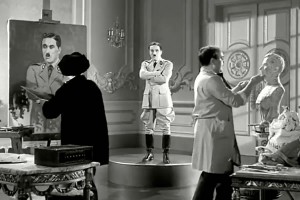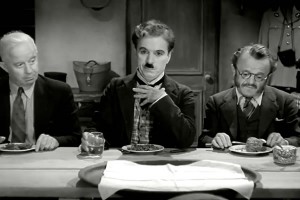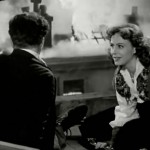 Charlie Chaplin plays two parts in this film. The first is Hitler spoof Adenoid Hynkle, dictator of Tomania. We see his tyrannical rule fed with all the megalomania, infallibility and extreme vanity one would expect of someone who lives in their own small world. Meanwhile on the outside a Jewish barber (also played by Chaplin and strikingly similar to his ‘Little Tramp’ silent movie persona) is on the receiving end of the brutish anti-semetic barbarism of Hynkle’s stormtroopers. He is eventually imprisoned but escapes only to be mistaken for Hynkel. Taken to a rally he is forced to make a speech, which he does reluctantly at first, but the speech is inspired, utopian and ends the film terrifically. Not funny, nor tragic but heartfelt, sober, real and relevant even today!
Charlie Chaplin plays two parts in this film. The first is Hitler spoof Adenoid Hynkle, dictator of Tomania. We see his tyrannical rule fed with all the megalomania, infallibility and extreme vanity one would expect of someone who lives in their own small world. Meanwhile on the outside a Jewish barber (also played by Chaplin and strikingly similar to his ‘Little Tramp’ silent movie persona) is on the receiving end of the brutish anti-semetic barbarism of Hynkle’s stormtroopers. He is eventually imprisoned but escapes only to be mistaken for Hynkel. Taken to a rally he is forced to make a speech, which he does reluctantly at first, but the speech is inspired, utopian and ends the film terrifically. Not funny, nor tragic but heartfelt, sober, real and relevant even today!
 Despite the release of “talkies”, Charlie Chaplin continued to produce and excel in silent films. But then in 1940 he wrote, produced and starred in this film. It was his first talking picture and was to become his most commercially successful film. They say the secret of comedy is timing. How appropriate then that a significant factor in this film is specifically the year it was released. It became a major propaganda weapon of its time stirring anti-nazi feeling in the States, who had yet to join the war. Its release in Britain in 1941 wouldn’t have happened two years earlier due to Chamberlains appeasement policy to Nazi Germany. However, Britain was now at war with Germany and for the box-office it was a hit!
Despite the release of “talkies”, Charlie Chaplin continued to produce and excel in silent films. But then in 1940 he wrote, produced and starred in this film. It was his first talking picture and was to become his most commercially successful film. They say the secret of comedy is timing. How appropriate then that a significant factor in this film is specifically the year it was released. It became a major propaganda weapon of its time stirring anti-nazi feeling in the States, who had yet to join the war. Its release in Britain in 1941 wouldn’t have happened two years earlier due to Chamberlains appeasement policy to Nazi Germany. However, Britain was now at war with Germany and for the box-office it was a hit!
However I believe this film strikes most poignantly with the benefit of hindsight. After all this was released at the start of 1940, when a majority of the war was yet to happen. Unbeknownst to Hollywood or its contemporary audience, the Holocaust had begun. Pleas from the Jewish characters to be accepted and live in harmony with their fellow man rather than be forced to “leave and go to another country” are more poignant now than they were probably meant at the time. The glee from a commandant that they had found a gas that “will kill everyone” now seems frighteningly prophetic. And in his utopian speech at the end, in which he engages mankind to aspire to peace, harmony and racial/relegious tolerance, Chaplin’s astute observation then, reflects accurately on how history now remembers Hitler and the Nazi’s. “Machine men with machine minds and machine hearts!”

At the Jewish Barbers lowest ebb, we never see his face!
Chaplin gambled a lot with this film. American film critic Roger Ebert sums it up when he says “He [Chaplin] put the Little Tramp and $1.5 million of his own money on the line to ridicule Hitler”. It’s clear he is giving the performance of a lifetime, mixing his silent talent with a simple yet powerful storyline that doesn’t just contain dialogue, no! With this, his first talkie, Chaplin decides to make a point of actually saying something worth hearing. And boy, does he!
You must watch this film at some point in your life!
[rating=6]
